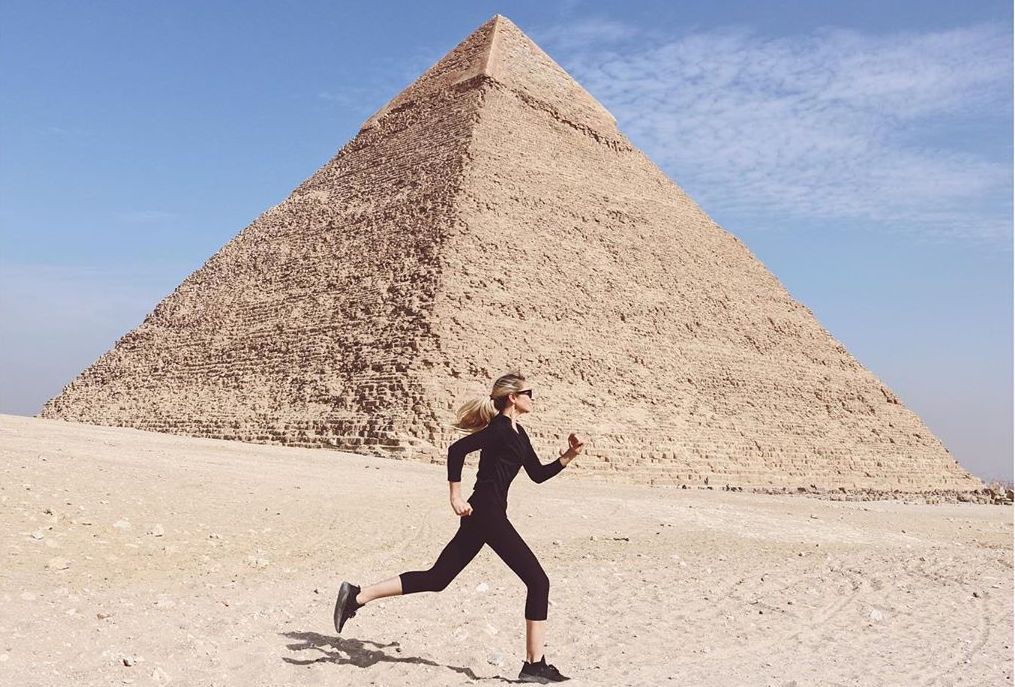
If you ask most people what they hope to achieve before they hit the dreaded 30, the answer will invariably involve money, real estate or both, but Liz Warner isn’t most people. For her 30th birthday next June, the American recreational runner wants 30 marathons in 30 different countries crossed off her bucket list.
With 25 already under her belt, the latest being the Luxor Marathon in Egypt, which took place last Friday, January 15th, Warner may just get her birthday wish.
Through her personal project Run to Reach, Warner is seeking to promote gender equality, dedicating her last 20 runs to support the work of women’s rights organizations in different countries. Over the past seven years, her 30 before 30 journey has taken her around the world—from Tokyo, to Chile, all the way to Zimbabwe.
Like most big ideas, Run to Reach came at a fateful moment. Having just finished graduate school and joined a PR company in Paris, reality started to set in for a newlywed Warner.
“I was sitting in the car, it was sort of this moment of silence between me and my new husband and I was thinking, I need a new goal ahead of me, something really big that I could take time to work towards,” she recounts. “I wasn’t really enjoying my job and going through a mini existential crisis and I was like, wow, life is really happening now, I might really have to settle down soon. So this idea to do this project popped in my head during my honeymoon, actually.”
Unlike many serial marathoners, Warner’s passion for running is not driven by competition. The urban athlete turned to running following the passing of her father during her senior year in Bowdoin College and hasn’t looked back ever since.
“Running quickly became my outlet, so I signed up for my first marathon [in Japan in 2013]. It was this amazing experience for me, it gave me a lot of confidence and running has always been meditative for me,” she explains.
In 2019, her running evolved beyond physicality to include a developmental, social and political component. In less than three months, the Atlanta native planned her Run to Reach tour de force, coordinating her campaign with civil society organizations in over 20 countries.
“I think pairing this mission with working with all these partner organizations was something that definitely could add a much deeper side of this project,” she says. “I realized by working with several [women-focused] NGOs that my passion lied in this particular cause. Originally my project was a bit scattered all over the place.”
Although the Luxor Marathon reportedly saw very little participation from Egyptian women, Warner’s time in Egypt saw her partner up with Heya Masr, an Egyptian social enterprise that offers character building courses to youngsters and teens, ranging from self-defense training to health awareness classes.
“What really stood out to me about Heya Masr is that they put together an intensive 6-month-long character building workshop for girls and boys aged seven-14 and they go to probably some of the poorest areas in Cairo,” she remarks. “They have sexual harassment and bullying workshops as well, and the fact that they are bringing boys into the conversation is huge…Men especially with this topic are just as much part of the conversation, especially when they are younger.”
One remarkable stop on Warner’s journey was Bamyan, where she ran the Marathon of Afghanistan last October. Launched in 2015, the event put Afghanistan on the map after it saw Zainab make history, becoming the first Afghan woman to complete a marathon on Afghan soil.
Despite Zainab’s historic feat, Afghan women and girls continue to be excluded from the country’s public spaces, a culture that not only discourages, but actively bars Afghan women from simple activities like running. “It is really hard for women to run there, it is almost impossible. They get stones thrown at them and they are called prostitutes if they are just running openly in the street,” she says.
For her run in Afghanistan, Warner partnered up with Free to Run, a local initiative that offers women leadership and health workshops and provides safe spaces for women to train and run.
“There were 40 Free to Run runners who did the marathon in Afghanistan. You just see firsthand how much running has empowered these women and given them confidence,” she recalls. “It was probably the most inspiring moment of this journey so far—hearing how much running had empowered and given them a sense of independence and just pure confidence, and that they essentially have limitless potential.”
Yet Warner’s Run to Reach is about more than just empowering women or pursuing her love of travel and running, it is also about challenging the rigid bias narratives that demonize swathes of humanity. “All the negative images of countries like Afghanistan, Côte d’Ivoire, and Sierra Leone are just made up and spread by the media and for that I feel for the people in these countries,” she says. “Even Egypt, I hate to say it, but I am sure that probably 75% of Americans would be like, oh wow you’re traveling there alone as a woman?”
Warner believes that travelers should harness the power of their testimony to bridge cultural divides and deconstruct racism. “As global travelers, it is sort of our responsibility to tell a different side to these countries through the amazing people that are living there,” she says. “In Afghanistan, you would be on the street and people would invite you into their house for tea—you never get to hear those stories or are able to piece that together in a country that will forever be weighed down by everything that is happening.”
Ultimately, however, running is about power—the ability to push one’s body beyond its breaking point and transcending our human limitations in every sense of the word. But some bodies have long been co-opted as public property to carry our shame: women’s.
For women, running has always been political. Female joggers and runners in cities around the world experience verbal harassment and sexual violence and some never even make it through alive.
In countries like Egypt and Afghanistan and other conservative developing countries, women’s bodies are often under siege. In these social and cultural contexts, running can be a powerful exercise of bodily autonomy.
“Running is just barely putting one foot in front of the other and sometimes it does feel like that,” Warner reflects. “But I think, in the grand scheme of things, it is an incredibly empowering tool for women, especially those who don’t even have the right to run in their countries.”







Comments (0)